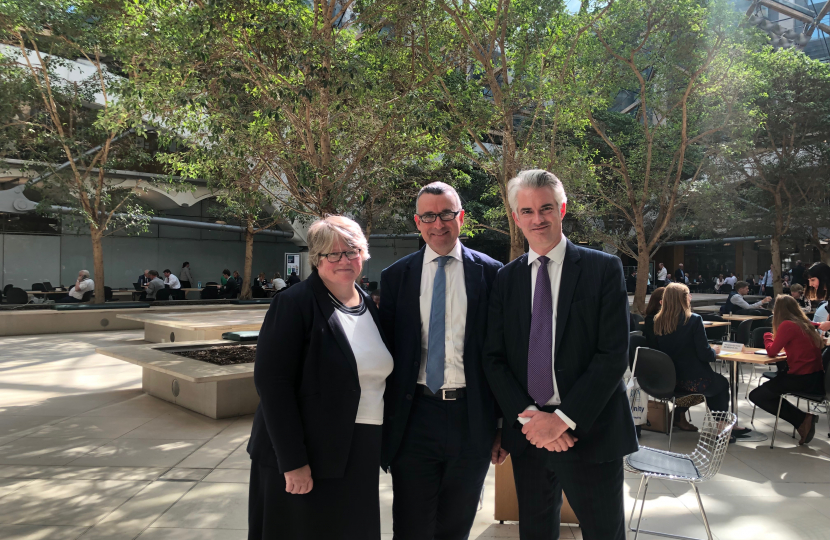
Sir Bernard Jenkin (middle) will be leading up the OffSET task force.
A task force has been set up to protect communities in Suffolk and Essex from the "worst impacts" of new energy projects - such as pylons and cables in the countryside.
The group, to be known as the Off Shore Electricity Grid Task Force (OffSET), will be led by Harwich and North Essex MP, Sir Bernard Jenkin.
It involves a number of local MPs including James Cartlidge and Therese Coffey as well as Suffolk County Council.
In a mission statement, released by the group, OffSET said that it wanted “strategic leadership” in the creation of an offshore electricity grid across the region.
It also said it wanted to “stand up” for the countryside of East Anglia to ensure that there was not “unnecessary damage to our communities or the environment”.
OffSET said communities needed a new deal when it came to the development of offshore wind farms, interconnectors and onshore connections.
There are a number of energy projects planned up and down our region’s coastline.
In Suffolk, there are the East Anglia One North and Two windfarm projects which would be located off the coast of north Suffolk, a 30-acre substation has been applied for by Scottish Power at Friston and last month National Grid ventures revealed that it would be consulting on new plans to create a subsea electricity cable from Suffolk to Belgium that looked to connect to the coast at Friston.
OffSET said it wanted to “speed up” the Government’s timetable to transition to the offshore transmission system to protect communities from the damaging effects of “multiple cable corridors”.
The group aims to scrutinise new policies and initiatives as well as being a contact point for ministers, senior officials and other interested parties to speak with.
The group will also be inviting key stakeholders and community groups to meet with them, to better understand the impacts, and opportunities, of Net Zero transmission and generation infrastructure in the region.
Group chair, Sir Bernard Jenkin MP, Harwich and North Essex, said: “The threat of new pylons across Dedham Vale is short-sighted and completely unnecessary. If the government had a proper strategic plan for the National Grid to address offshore wind, new nuclear, and international interconnectors, then we would be planning an off-shore ring-main, not more onshore pylons.”
James Cartlidge MP, South Suffolk, said: “I am proud of the huge contribution that our region is making to reaching our net zero targets, but this cannot come at a disproportionate cost to our beautiful countryside. It is vital that at all times we balance the need to reinforce the electricity grid against minimising detriment to our landscape, e.g., by using undersea cables and undergrounding through sensitive landscapes.”
Therese Coffey MP for Suffolk Coastal, said: “Whilst integrating multiple projects is undoubtedly the right thing to do, rather than having separate connections, it’s essential our precious landscapes and communities are protected by placing the infrastructure in the appropriate place, preferably on brownfield land, like Bradwell.”
Richard Rout, deputy leader and cabinet member for finance & environment for Suffolk County Council, said: “The County Council has long stated its support for renewable energy generation and the Government has quite rightly set ambitious targets in this area. However, to deliver on these it is essential that public support is maintained for the necessary transformation of the energy system.
"This means a much more coordinated approach is needed, with more transmission being delivered offshore. We must also see full engagement with our communities so that they and our unique natural environment are protected.”
Michael Mahony, from Substation Action Save East Suffolk (SASES), said he was pleased with the news.
“I very much welcome the setting up of this task force,” he said.
“I also very much welcome Therese Coffey’s comments about brownfield sites and Bradwell.
“It’s got to be remembered, however, that East Suffolk and its environment and its tourism remain under threat from multiple offshore energy projects.”
A spokesperson for National Grid, one of the companies involved in the projects said: "To deliver the UK target of net zero greenhouse gas emissions by 2050, how we generate electricity is changing, moving from fossil fuel generation to renewable and low carbon sources.
"This means energy is coming from new sources in new places. To get power from offshore wind farms to where it is needed, we need to find the best way to connect them whilst minimising the impact on communities, the environment and energy bill payers.
"National Grid supports the Government’s review into the process for connecting new offshore wind to the onshore electricity grid. We are committed to working with all stakeholders to ensure the best overall onshore solution, in terms of viability, cost and impact.”
Published by the East Anglian Daily Times.


